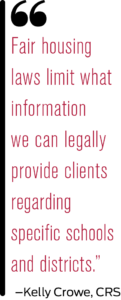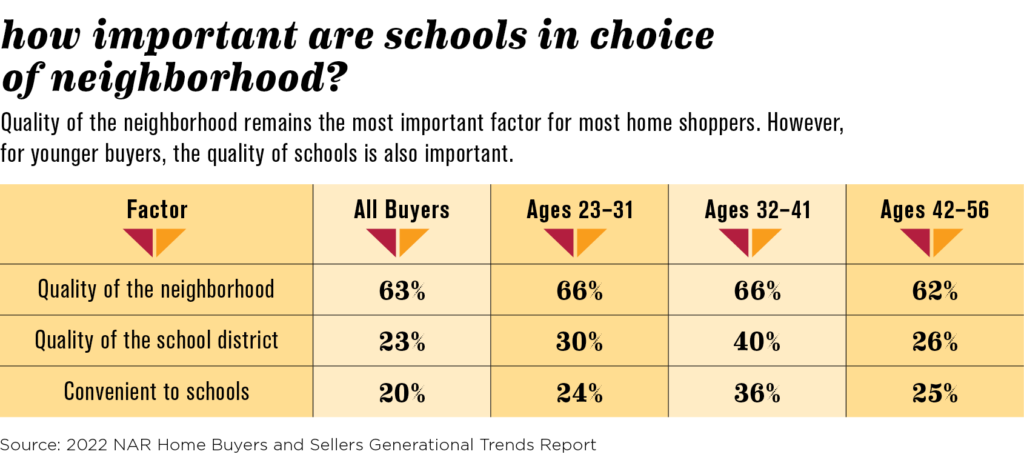Learn how to field and answer tricky questions from homebuyers who may be concerned about school options for their children
By Regina Ludes
Education plays a big role in the homebuying process.
When speaking with buyers during their home search, the subject of schools invariably comes up in conversation within the first few minutes, says Maura Neill, CRS, REALTOR® with RE/MAX Around Atlanta in Atlanta, Georgia. At that point, she begins to explain fair housing rules because most buyers don’t understand what an agent can and cannot tell them about schools.
“I want to make it clear what role I should take or if I have to take certain locations out of their search. That’s to protect them and me. Most clients will respect your need to follow fair housing laws,” says Neill, a former public school teacher.
According to the National Association of REALTORS® (NAR), 23% of homebuyers believe quality schools are an important factor when choosing a place to live. That rate increases to 30% for buyers in their twenties, and 40% for those in their thirties. Answering questions about school districts can be tricky, so agents should have a thorough understanding of fair housing rules and the NAR Code of Ethics before answering them. With this foundation, CRS agents can find ways to share resources about schools that help their clients make smart housing decisions without violating fair housing laws.
Observe district boundaries
When shopping for a home, many buyers are drawn to neighborhoods with better schools because they understand its impact on housing values and resale potential. Homes for sale in better school districts tend to be in higher demand and sell faster, too. There are downsides, however, such as higher property taxes and higher sale prices.
For many buyers, school districts are more important than a home’s location, says Rita Kula, CRS, associate broker with @Properties in Naperville, Illinois. Younger couples with kids or who plan to start a family insist on the better schools, she adds, while older couples and empty nesters care more about the house and its potential resale value.

But school district boundaries don’t always align with the towns they’re located, which can impact buyers’ housing options. “You can have a fabulous four-bedroom house backed up to a golf course, but it might still be located in a district with less desirable schools,” Kula says.
Some towns can be served by multiple school districts, as well. One such example is Bolingbrook, Illinois, which feeds into five different school districts, including several in neighboring towns. “It’s hard for people to grasp that they could live in one location but their school district is somewhere else,” Kula says.
For clients with strict budgets who still want the better school district, she might suggest searching for a home in neighboring communities that are more affordable but will still be in the school district they want.
To assist clients with their due diligence, Kula shares school rankings websites and school district profiles. She also provides a list of school districts with their boundaries and website links, and she encourages clients to call the districts to confirm their online information. “Even though I know where the good schools are, I advise clients to do their homework,” Kula says.
Provide resources and advice
When clients ask about schools, Kelly Crowe, CRS, associate broker with Baird Warner in Geneva, Illinois, responds by sharing the link to Illinois Interactive Report Card, an online website that publishes academic performance of public schools in the state, such as graduation rates, school finances and student demographics. Crowe also encourages them to contact the school district if they have questions or to schedule a school tour. “Some kids may have special needs, while others are interested in sports or are looking for gifted programs. Parents know best what their kids need,” Crowe says.
When one of her clients asked to search for a new home in the same elementary school district that her child was already attending, Crowe did a map search in the MLS to find homes for sale in that area. “That’s not a violation of fair housing laws because, in that instance, my client told me what she needed for her child,” Crowe explains. “As agents, we have to guide our clients to the information they’re requesting for their home search. Fair housing laws limit what information we can legally provide clients regarding specific schools and districts,” Crowe says.
Brian Harris, CRS, broker with Kentwood Real Estate in Denver, Colorado, estimates that three out of five clients inquire about schools. While many of his clients have kids, others don’t but still seek a home in a good school district because of the higher property values.
To aid in clients’ school research, Harris offers several resources, such as district maps or school websites. He sometimes drives clients around town to show where schools are located, and he and his wife have coordinated school tours for clients.
If someone asks about a specific school and it’s one that Harris’s own kids attend, he’ll share his personal experiences with the client as a parent would, which doesn’t violate fair housing laws. Otherwise, Harris recommends they check out online sites such as GreatSchools.org, which rates public and private schools based on different criteria, such as graduation rates, student test scores and parental feedback.
“If clients tell me that they want to focus only on schools with a ranking of seven or higher, I can eliminate the neighborhoods with lower-ranking schools,” Harris says. “I never tell them ‘this is where you should look.’ I always recommend that they make their own decisions.”
Use caution
Despite the fanfare surrounding school ratings sites, Neill cautions clients about relying too heavily on them for information. The scores, she explains, are based on algorithms, much like Zillow’s Zestimates, and aren’t always accurate. Buyers often have different criteria for assessing schools than the ones used by online sites. While the sites may be a good starting point for research and provide some valuable information about schools, Neill says they shouldn’t be used as a definitive guide about a school’s overall performance.
To encourage buyers’ own research, Neill refers them to the buyer library on her website where they can read about finding schools. When districts publish their school calendars, those links are posted on her website, too. She also encourages buyers to talk to school administrators and provides them with a list of sample questions they might ask.
“I want to be sure they’re searching for a school that’s the best fit for their child’s needs, not based solely on some numerical score,” Neill says.
Marketing tips
When marketing listings, Neill sticks to the facts. While she thinks it’s safe to mention that the house is located in a certain school district or that its football team won the state championship, she avoids expressing opinions or using subjective descriptions such as “desirable” or “best.”
Harris also emphasizes only factual information in his marketing. “If a school has received high rankings on GreatSchools.org or received some award or recognition for its academics, we might highlight it,” he says. “With more facts and data, clients can make better decisions.”
By providing clients with ample resources and sound advice, agents can give buyers the assistance they need to make smart housing decisions near schools that best fit their family’s needs.

NAR has a host of resources for agents to provide homebuyers looking at schools. Visit NAR.realtor/schools-the-homebuying-decision to learn more.
Photo: iStock.com/FatCamera








